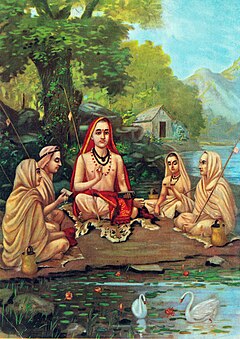
Back يوغا جنانا (المعرفة) Arabic Jnana yoga BCL জ্ঞানযোগ Bengali/Bangla Jnana Yoga German Jñāna yoga Spanish جنانا یوگا Persian Jnana yoga French ज्ञान योग Hindi Dzsnyána-jóga Hungarian Jnana Yoga ID

| Part of a series on |
| Hinduism |
|---|
 |
Jnana yoga (IAST: Jñāna yoga), also known as the jnana marga (jñāna mārga), is one of the three classical paths (margas) for moksha (liberation)[1][2] in Hinduism, which emphasizes the "path of knowledge",[3] also known as the "path of self-realization".[4] The other two are karma yoga (path of action, karma-mārga) and bhakti yoga (path of loving devotion to a personal god, bhakti-mārga).[1][5][6] Modern interpretations of Hindu texts have yielded systems, techniques and formulations such as raja yoga and kriya yoga.[7][8]
The jñāna yoga is a spiritual practice that pursues knowledge with questions such as "who am I, what am I" among others.[9][10] The practitioner studies usually with the aid of a guru, meditates, reflects, and reaches liberating insights on the nature of one's own Self (Atman, soul) and its relationship to the metaphysical concept called Brahman in Hinduism.[4][11][10] The jñāna-mārga ideas are discussed in ancient and medieval era Hindu scriptures and texts such as the Upanishads and the Bhagavad Gita.[4][12][13]
- ^ a b P. T. Raju (1985). Structural Depths of Indian Thought. State University of New York Press. pp. 7–8. ISBN 978-0-88706-139-4.
- ^ Jeaneane D. Fowler (2012). The Bhagavad Gita: A Text and Commentary for Students. Sussex Academic Press. pp. 89–93. ISBN 978-1-84519-346-1.
- ^ Flood 1996, p. 127.
- ^ a b c James G. Lochtefeld (2002). The Illustrated Encyclopedia of Hinduism: A-M. The Rosen Publishing Group. pp. 321, 93–94. ISBN 978-0-8239-3179-8.
- ^ Matilal 2005, p. 4928.
- ^ Klaus K. Klostermaier (2007). A Survey of Hinduism: Third Edition. State University of New York Press. pp. 119–120. ISBN 978-0-7914-7082-4.
- ^ Roderick Hindery (1978). Comparative Ethics in Hindu and Buddhist Traditions. Motilal Banarsidass. pp. 26–27. ISBN 978-81-208-0866-9.
- ^ George D. Chryssides (2012). Historical Dictionary of New Religious Movements. Rowman & Littlefield. p. 285. ISBN 978-0-8108-6194-7.
- ^ Richard Dewey Mann (1984). The Light of Consciousness: Explorations in Transpersonal Psychology. State University of New York Press. pp. 21–25. ISBN 978-0-87395-905-6.
- ^ a b [a] Ravi Dykema (2011). Yoga for Fitness and Wellness. Cengage. pp. 10–11. ISBN 978-0-8400-4811-0.;
[b] Orlando O. Espín; James B. Nickoloff (2007). An Introductory Dictionary of Theology and Religious Studies. Liturgical Press. p. 676. ISBN 978-0-8146-5856-7.;
[c] John M. Rector (2014). The Objectification Spectrum. Oxford University Press. pp. 198–201. ISBN 978-0-19-935542-6. - ^ Stephen Phillips (2009). Yoga, Karma, and Rebirth: A Brief History and Philosophy. Columbia University Press. pp. 178–182. ISBN 978-0-231-14485-8.
- ^ Jean Varenne (1989). Yoga and the Hindu Tradition. Motilal Banarsidass. p. 234. ISBN 978-81-208-0543-9.
- ^ Roy W. Perrett (2012). Indian Philosophy of Religion. Springer Science. pp. 44–51. ISBN 978-94-009-2458-1.
© MMXXIII Rich X Search. We shall prevail. All rights reserved. Rich X Search